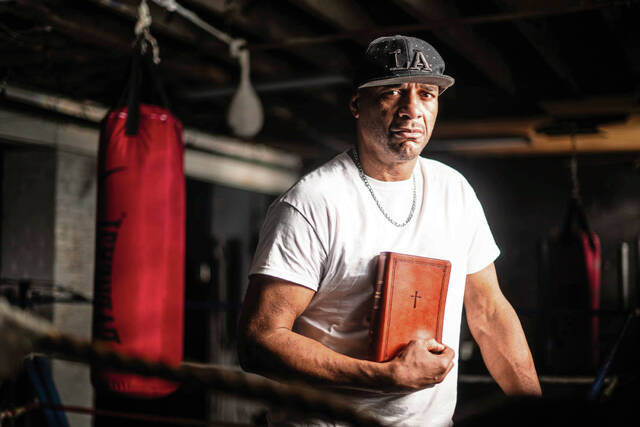The time, thought and effort that English teachers and librarians put into their work is not random, says Deborah Caldwell-Stone, director for the American Library Association’s Office for Intellectual Freedom.
“They have college degrees, they care very deeply about the work they do, and to suggest that the objections of a few people should take that away? That’s not what you want,” she said.
On Wednesday, the Franklin Regional School Board’s curriculum committee will meet for the first time after the district’s decision not to teach Marjane Satrapi’s “Persepolis” in the ninth grade honors English class. It was a decision reached after several people complained to school board members, who in turn brought those concerns to district administrators.
The graphic novel — which centers on the author’s life as a young teenager living through the Iranian Revolution and the harsh regime that followed — was approved last year by the curriculum committee and the school board.
While none of the people who complained spoke at last week’s school board meeting, parents of several children in the class asked the district to reconsider pulling the book from the classroom.
Multiple parents asked why the book was an issue at all, given its previous approval as part of the curriculum.
“Each committee member is given the latitude to individually research each novel presented through the lens of their own perspectives,” school board and curriculum committee member Mark Kozlosky told the Tribune-Review. “Then it’s presented at the curriculum committee meeting by the staff, where a committee discussion could take place between educators and committee members.”
Kozlosky said the committee plans to discuss the book at its 5 p.m. meeting, to be held in the district’s administrative offices at Newlonsburg Elementary School, 3170 School Road.
Book-challenge lists
Franklin Regional is not alone in dealing with this issue. The Hempfield Area School Board’s April 4 agenda includes a discussion about tweaking a policy related to reevaluating course materials after high school students were allowed access to two books deemed inappropriate by a small group of parents.
And such discussions are not limited to Pennsylvania.
Students in the Chicago public school system rose up in protest when administrators attempted to ban the teaching of “Persepolis” in the mid-2010s.
In Florida, a bill is headed to conservative Gov. Ron DeSantis’s desk this week that would allow any resident — not just school parents — to challenge any book publicly available in a school district.
The bill mandates that a constant list be maintained of all available books. It also sets up a framework to challenge them.
Caldwell-Stone said it is part of a trend the ALA has been seeing in recent years, with lists of potentially controversial books circulating via social media.
“A decade ago, a challenge might have been a very local thing and actually reflect a deeper debate on the content of the book,” she said. “We’re now seeing challenges pop up based solely on social media posts. A video gets posted of a parent complaining at a school board meeting, and within days, we see challenges across the country using the same reasons. People are complaining because they saw it on social media, not because they actually engaged with the book.”
Jonathan Friedman, director of free expression and education at the nonprofit PEN America in New York City, said he has seen that as well.
“People are increasingly citing texts simply because they’re on some list of ‘controversial’ books,” he said. “They see it on these lists, and if it’s being taught in their school, they challenge it. I’ve seen it called ‘the new illiteracy,’ where parents are not reading the book they’re challenging, and, in some cases, they’re proud to say so.”
Challenges have gone beyond the borders of school districts. In Texas, the push to ban books deemed controversial or inappropriate has spread from school districts to include public libraries.
Caldwell-Stone said the pace of book challenges has clearly been escalated by social media.
“We’ve seen almost a tripling of challenge reports,” she said. “In 2019, we received 377 reports for the entire year. Between Sept. 1 and Nov. 30, 2021, we received 330. And the phenomenon continues at a rate I’ve not seen in my 20 years with the ALA. We’re seeing organized campaigns from groups styled as parent rights organizations.”
She said things like the Florida bill are troubling for a group that prides itself on fighting censorship.
“We’re seeing the rise of elected officials getting involved in the effort to censor materials, which is deeply troubling given that they’re sworn to uphold the Constitution and the First Amendment,” she said.
Teaching real-world topics
Literature in schools is often a means of confronting and teaching real-world topics, Friedman said.
“The real world contains a number of topics people find unsettling or difficult to discuss,” he said. “And there’s a wide-ranging discussion around the world about what those discussions are appropriate for.”
Friedman said book challenges — which frequently succeed and whose pace has been accelerating in recent years — “take away the exact faith we’re supposed to be placing in educators to determine the appropriate age for children to encounter these themes and what literature they should read.”
The 2007 animated film version of “Persepolis” was rated PG-13 by the Motion Picture Association of America. The average high school freshman is 14 or 15 years old.
“We’ve always supported parents’ choices to guide their children’s reading, but we’ve always said that a small group of parents should not be able to restrict what all students can read, even if it’s a book that challenges your own ideas,” Caldwell-Stone said.
“Persepolis” and the other books proposed for the ninth grade honors English curriculum — which included the frequently challenged J.D. Salinger novel “The Catcher in the Rye” — were on public display prior to approval by the school board. Any parent who objected had the opportunity to have their child read an alternate novel.
“The book went through the local processes, was approved like any other work of literature, and now a little controversy is causing them to question the work of professional educators,” Caldwell-Stone said. “Ultimately, if a parent has passed on their values, it’s hard to believe a simple book can change those values. But it may give the student a better idea of how to engage with the world, have a fuller understanding of individuals and their backgrounds, and develop empathy as they go out into the world.”








